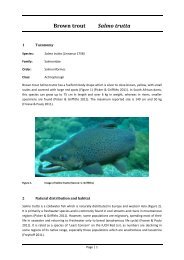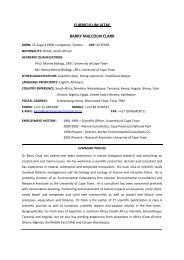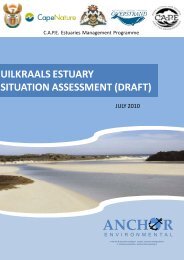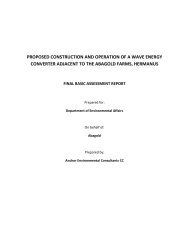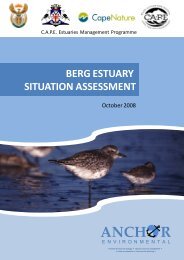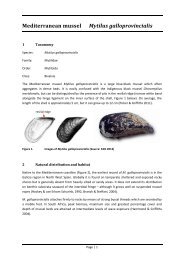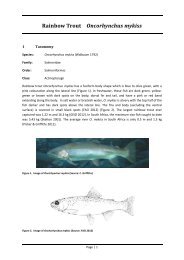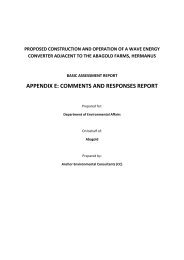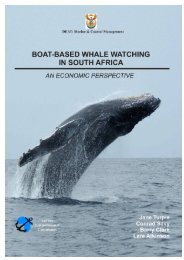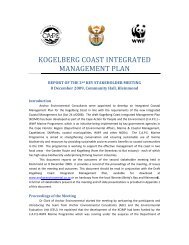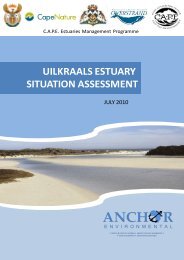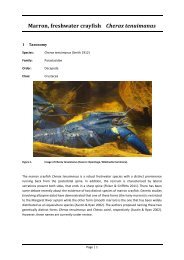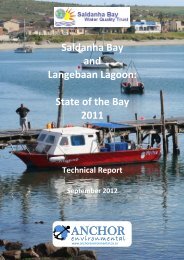Download PDF - Anchor Environmental
Download PDF - Anchor Environmental
Download PDF - Anchor Environmental
You also want an ePaper? Increase the reach of your titles
YUMPU automatically turns print PDFs into web optimized ePapers that Google loves.
9 IMPLICATIONS FOR FUTURE MANAGEMENT: A<br />
SCENARIO ANALYSIS<br />
9.1 Introduction<br />
While an understanding of the total economic value of the delta is potentially useful for lobbying for<br />
conservation support, consideration of how this value might change under different management or<br />
policy scenarios is potentially a far more useful undertaking for decision-makers. Numerous<br />
development options have been considered for this area in the past, such as irrigation schemes and<br />
water transfers out of the Okavango. Various management options have been considered which<br />
affect the location and extent of veterinary fences and wildlife management areas, or consumptive or<br />
non-consumptive use of wildlife, the density of tourism developments, etc. In addition, it would be<br />
prudent to consider the effect of matters beyond local control, namely climate change which threatens<br />
to alter rainfall patterns and flooding of the Okavango. This chapter considers a handful of feasible<br />
scenarios in order to investigate how the economic value of the Okavango Delta would be affected.<br />
It should be emphasised that this entire study was carried out as a brief exercise where the main<br />
emphasis was on deriving the current value of the delta. This scenario analysis is purely a desktop<br />
analysis, and essentially a back-of-the-envelope exercise designed to explore the possible types of<br />
outcomes under different scenarios. Spatial data on values are not detailed enough to allow accurate<br />
calculation of scenario impacts. Thus estimates of biophysical changes that would lead to changes in<br />
economic value were made on the basis of educated subjective estimates made by team members. If<br />
these outcomes are of particular interest it would be worthwhile investigating the assumptions further<br />
in a dedicated study.<br />
9.2 Description of selected scenarios<br />
The scenarios considered here were developed based on scenarios that have already been<br />
considered for the delta at one stage or another, or that would illustrate an extreme case. The<br />
proposed scenarios were discussed in a stakeholder workshop during an early part of the study. The<br />
list of scenarios considered here is not comprehensive, however. For example, it has been argued<br />
that Moremi should be opened up to CBNRM to reduce conflicts between Khwai residents and the<br />
wildlife tourism sector, since the establishment of Moremi ain 1963 led to displacement of Khwai<br />
residents from their land, and affected the Basarwa’s hunting and gathering economy (Mbaiwa 2005).<br />
We have not considered such a scenario.<br />
The present situation is described in detail in Chapter 2. The following potential future scenarios were<br />
investigated, each of which is described in more detail below:<br />
1. Agricultural expansion<br />
2. Expanded protection<br />
3. Wise use<br />
4. Wise use plus abstraction<br />
5. Wise use plus climate change<br />
The planning document by Plantec et al. (2006) was used to guide the wise use scenarios.<br />
76



